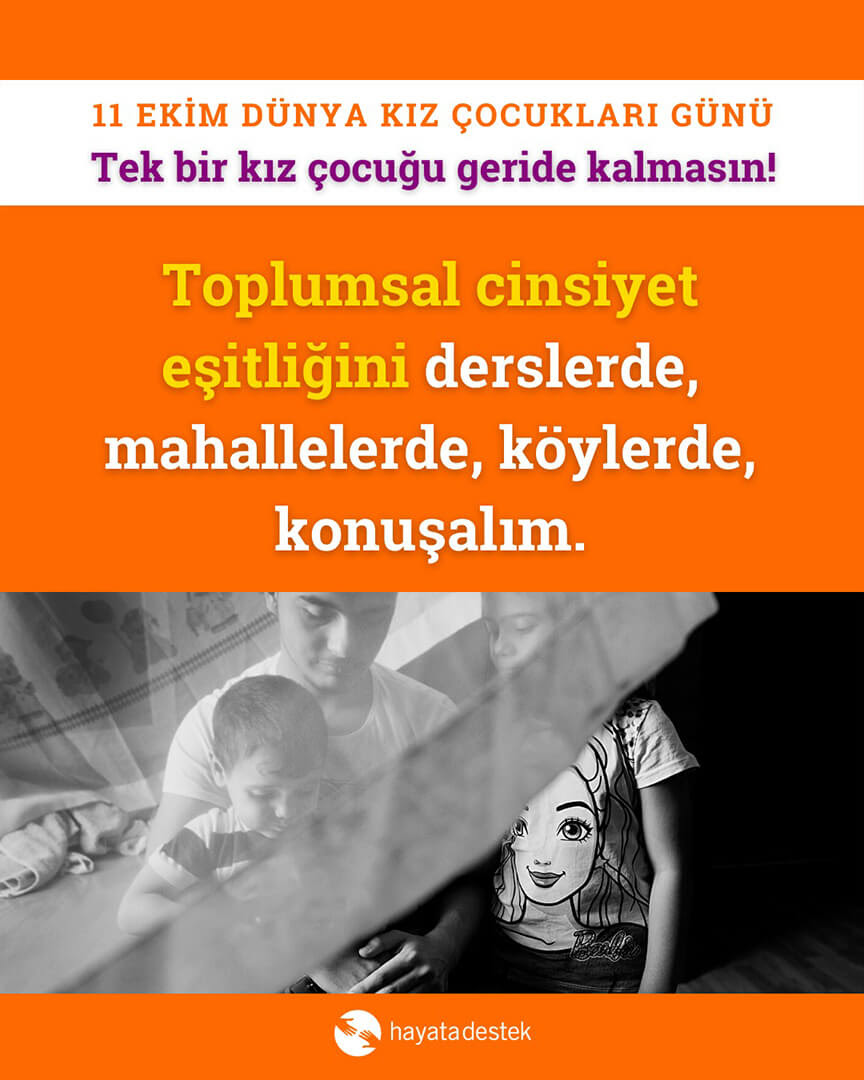

October 11, International Day of the Girl Child, is celebrated to draw attention to the discrimination faced by girls since 2011, with the decision of the United Nations (UN). This year, setting the theme of "Digital generation. Our generation.", the UN emphasizes the barriers in front of girls in accessing digital tools, the importance of which has increased exponentially during the COVID-19 pandemic. A UNICEF report shows that internet use and mobile phone access among boys is higher than among girls.
On the other hand, the distance education process allows girls to take responsibility for matters such as housework and child care; caused them to be unable to participate actively in education. As a report prepared by the Ministry of National Education indicates, especially girls from crowded, low-income families have taken on more housework responsibilities in this process. So much so that although schools are now open, it is estimated that many girls will not be able to attend school. UNICEF underlines that approximately 10 million girls worldwide are at risk of child marriage after the pandemic.
Refugee girls are at greater risk due to access to education, language barriers, and financial difficulties. These girls are also at higher risk of being married off at an early age.
WHO SHOULD DO WHAT?
Public institutions, including the Ministry of National Education, the Ministry of Family and Social Services, and professional organizations such as local administrations, civil society organizations, Bar Associations, and Medical Chambers; Educators, parents, the media, and indeed all adults have things to do for girls to have access to their rights.
Change in language
Expressions that reinforce gender-based discrimination should not be used, such as "You are a girl, you cannot do it, a girl does not study, a girl does the housework".
Education participation support
The participation and continuity of girls in education should be investigated, the causes of the identified problems should be determined, and the whole society and relevant public institutions, especially the Ministry of National Education and civil society organizations, should carry out studies in cooperation to eliminate these reasons.
Equal rights awareness
Public institutions and civil society organizations such as the Ministry of National Education should inform society about children's rights and gender equality. Training and awareness-raising activities should be carried out not only in meeting rooms but also in neighborhoods, villages, and places where everyone can be reached. Children's rights and gender equality curriculum should be established in schools.
The media should take responsibility and create content that will increase awareness of children's rights and gender equality in its channels.
Protection from abuse
Any abuse against children should be reported to the authorities. To prevent all kinds of abuse against children; it should be announced at every opportunity that a notification can be made to the Child Services Unit or Social Service Centers of the Ministry of Family and Social Services, ALO 183 Social Support Line, Police Departments, Health Institutions, CIMER, 155 to the police, 156 to the gendarmerie. New and effective grievance mechanisms should be established and used, accessible to all children without discrimination. Mechanisms such as the ALO Child Line, which includes professional and expert officials, should be increased.
Safe areas
The Ministry of National Education, educators, parents, and civil society organizations should create safe spaces where children can make their voices heard in schools, homes, and community centers; should create opportunities for them to express themselves through games and psychosocial support activities.
Digital skills support
Efforts should be made to ensure that girls and boys use the internet, have equal opportunities to access digital tools, and support girls' digital skills. Studies should be carried out to identify children who cannot access digital resources, who do not know how to access digital resources or use the internet. Mobile teams should be established and all children, especially girls, should be trained to meet the digital world, and this training should be expanded in schools. Educational policies that support digital skills for girls should be followed.

WHAT ARE WE DOING?
As Support to Life Association, we work on the basis of the principles of non-harming, best interests of the child, child participation, non-discrimination, accountability, confidentiality and child safety when we support children.
Thanks to the "Girls Empowerment" program we run in Diyarbakır, Hatay, Mardin and Şanlıurfa fields, we reach many girls. Within the scope of this program, where we have reached 119 girls so far, girls discover their common needs and ways of coping; they realize their strengths together and establish networks of solidarity. In addition, these girls can benefit from mechanisms such as psychological support, Turkish language course, homework support.
As Support to Life Association, we celebrate the International Day of the Girl Child of all girls in the world. We will continue to work with the dream of a world without inequalities and where every child can access their rights.

